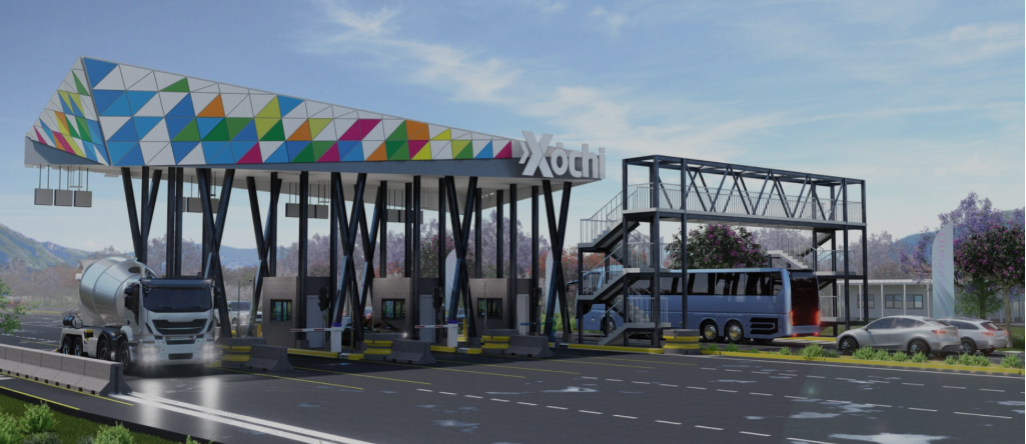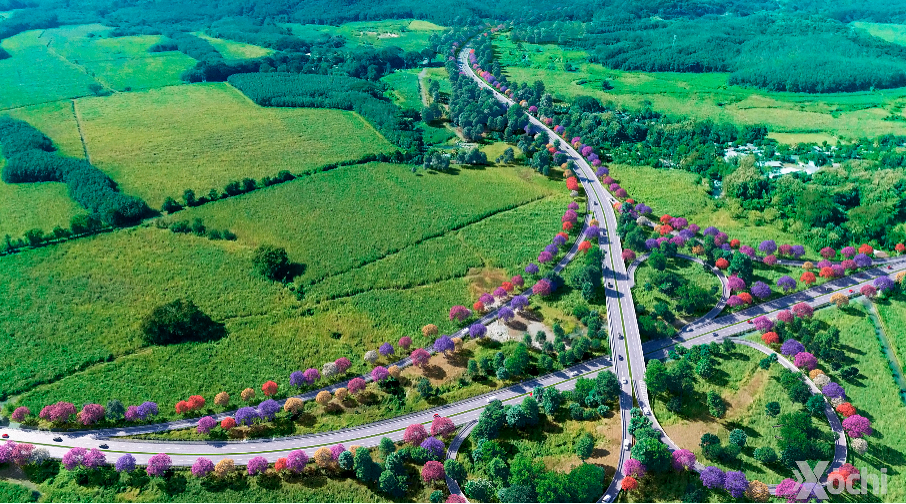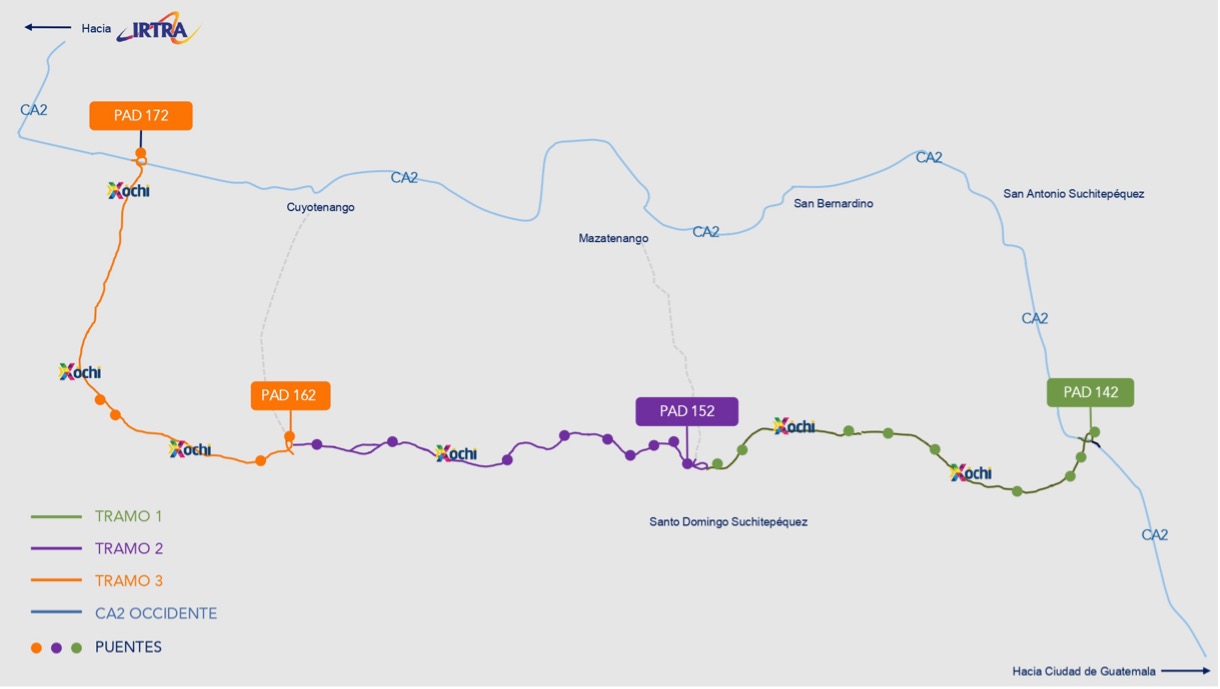
A Guatemalan project designed to reduce traffic congestion and deliver on economic and sustainability goals becomes the first in Latin America to obtain an Envision award.
The Institute for Sustainable Infrastructure (ISI) has awarded an Envision Verified Award to the Xochi Highway Project, Corredor de las flores, which aims to alleviate congestion along Guatemala’s Central American Highway 2 West (“CA-2 Occidente”) in the departments of Suchitepéquez and Retalhuleu. The result will be a new bypass road that connects km 142 to km 173 of CA-2 Occidente, avoiding the region’s most heavily congested cities. It is designed to not only reduce congestion and accident risks in cities and communities along the corridor, but also mitigate the visual, noise, and air pollution impacts caused by daily light and heavy vehicle traffic. Built to international safety standards, the four-lane 31-km toll road has a right-of-way width of 50 metres and a design speed of 80 kilometers per hour.
Covering an area of approximately 175 hectares, the US$257-million project includes, four road interchanges, 23 bridges (15 over rivers and 8 over local roads), acceleration and deceleration lanes, stormwater drainage systems, vaults for dry crossings, toll booths, administrative buildings with basic services, signage and metal barriers, and utility infrastructure.
The project is being implemented as a private partnership (without government participation) under the leadership of Fondo BPS, a IDC Group company, with financial support from Banco Industrial, Guatemala’s largest bank, and IDB Invest, the IDB’s private sector arm. This innovative model demonstrates that private investment can lead the way in sustainable infrastructure transformation in the region.
Quotes:
Carlos Colom, Chairman of the Board of Directors, BPS Fund:
Being the first road infrastructure project in Latin America to obtain an Envision award is further proof of the commitment of Xochi’s developers to building a world-class project that is unique in Guatemala and the region for many reasons. The Envision Framework takes into account important aspects such as improving people’s quality of life, efficient use of resources, and care for the environment, which makes us proud that such a prestigious independent evaluation recognizes our commitment to making this a unique project and a model for future development.
Luis Pedro Batres, General Manager of the Xochi Project:
As General Manager of the Xochi Project – Corredor de las Flores, I am proud to announce that we have obtained Envision verification, positioning us as the first infrastructure project in Latin America to achieve this standard. This technical achievement reflects our commitment to international best practices in sustainability, resilience, and efficiency. I congratulate the entire multidisciplinary team that worked with rigor and dedication to achieve this important milestone for our project. We deeply appreciate the support of IDB Invest, the consulting firm Typsa, and the Sustainable Infrastructure Institute (ISI), who were key partners in this process.
Rodolfo Martínez, Commercial, Operations & Maintenance Manager, Xochi Highway Project:
The Xochi Highway Project is more than just a road — it is a vital enabler of economic resilience and regional competitiveness. This corridor carries over 50% of Guatemala’s GDP and serves as the main land route between Mexico and Central America. By enhancing travel safety and reducing transit times, we are boosting the efficiency of our export industries, improving the quality of life for thousands of transporters, tourists, and residents, and opening doors for development in the southwestern communities of the country. What I admire most about this project is how it combines world-class engineering with a deep sense of environmental responsibility and social commitment. Xochi is proof that infrastructure can be sustainable, inclusive, and transformative.
Inmaculada Calama, ENV SP from TYPSA (Lead Envision Firm):
The review process of the Xochi project under the Envision framework has highlighted the significant efforts made in terms of environmental protection, improving the quality of life and economic development of the affected communities, infrastructure resilience, and leadership in sustainability that the project has incorporated since its inception, making this project an example of sustainable infrastructure.
Kailey Eldredge, Verification Director at ISI:
The Xochi Highway Project becomes the first in Latin America to receive an Envision Award — truly an achievement worth celebrating. Planning and designing this as a community-centered project, the project team remained focused on ensuring it will deliver long-term benefits to the local population. As the ‘Corredor de las flores’ brings tangible achievements that cross each area of the Envision framework, the project can be a model for future transportation infrastructure projects to emulate.

Verified Sustainability Achievements
Improving Mobility and Connectivity – CA-2 Occidente is a vital artery for trade in Guatemala and also one of the main routes for trade entering and leaving the border with Mexico. The Xochi Highway Project will ease long commutes and traffic delays by providing an alternative route, reducing travel time from more than three hours to just 25 minutes for the over 22,000 daily travelers expected to use the road once complete, and will also facilitate trade to and from the Mexican border.
Stimulate Economic Prosperity and Development – Some 1,376 direct jobs and approximately 3,097 indirect jobs are expected to be created during the construction phase. Job creation and skills development will also come from the operation and maintenance phases. Furthermore, programs are being implemented such as:
- Emprendex, focused on strengthening entrepreneurship among women and young people, which includes the development of incubators and reforestation with native species in areas along the right-of-way.
- Xamba, which promotes local job creation during construction.
Preserving historical and cultural resources – The highway project is called Xochi because it means “path of flowers” in Nahuatl, an indigenous language of Guatemala, reflecting its cultural and environmental integration. Specifically, the project will plant native trees and flowers along the highway, creating a scenic route that beautifies the environment and promotes biodiversity. The project team committed to ensuring that respect for local culture and careful integration into the environment were fundamental elements of the project. To support this initiative, the BPS Fund implemented a people-centered approach that reinforced the importance of citizen participation in the exploratory stages of large-scale projects.
Emphasizing worker safety during construction – The owner and the project contractors share a unified vision regarding the importance of worker health and well-being across all job sites. From the project’s initial phases, the project team developed and implemented supervision and safety enhancement plans, reliable feedback and risk assessment mechanisms, and comprehensive health, wellness, and safety programs for both workers and the public. Key strengths of these plans include intensive on-site worker training across different construction activities and a free medical check-up schedule with regular vital sign monitoring for all subcontracted workers.
Control Invasive Species – Throughout project development, the project team committed to not using exotic species and/or potentially invasive exotic species in forest restoration areas. Use of native species in the reforestation design of right-of-way areas, material borrowing areas, and landfills will create a mixed forest of native species that is difficult for invasive species to penetrate. If invasive species are identified, their removal is recommended in accordance with the project plans.
Eliminating Pesticide and Fertilizer Use – The project team designed the reforestation of right-of-way and material lending and dumping areas with plants that will not require pesticides or fertilizers. Previously, territories covered by the project’s road section were mostly dedicated to agricultural or agroforestry monocultures of rubber, sugarcane, and oil palm that were often associated with the use of chemical fertilizers and pesticides to ensure the target production.
Reduced Emissions – Using the Inter-American Development Bank’s greenhouse gas assessment methodology, the project team estimated the greenhouse gas emissions from one year of operation and the result was extrapolated over a 25-year lifespan. Both vehicular traffic and electricity consumed by the buildings and facilities associated with the project were taken into account. The calculations indicate that 720,309.75 fewer metric tonnes of CO2 would be emitted (a 51.61% reduction). Fondo BPS will keep an annual record of the emissions associated with electricity consumption and vehicular traffic and analyze and implement measures with the potential to reduce emissions further over the project lifespan.
Responsible governance and citizen participation – From the earliest stages, local communities were actively engaged, with their input integrated into the design and planning of the project. Transparency, ethics, and accountability are guiding principles of management.
The impact of these sustainability achievements make Xochi a model for the future of infrastructure in Central America. Xochi is not just a highway. It is a symbol of how to build with a long-term vision, combining profitability, sustainability, and social cohesion. This Envision award positions the Corredor de las Flores as a regional benchmark for future investments in resilient and sustainable infrastructure.

PROJECT DETAILS AT-A-GLANCE
Title: Xochi: El Corredor de las Flores (Xochi Highway Project)
Location: Guatemala (Suchitepequez y Retalhuleu)
Envision Rating: Verified
Envision Award b: June 24, 2025
Envision Version: v3
Project Owner: Fondo BPS – Group IDC
Lead Envision Firm: TYPSA
Total Cost of Project: US$257M
Project Delivery Method: PPP
Project Status: Construction



